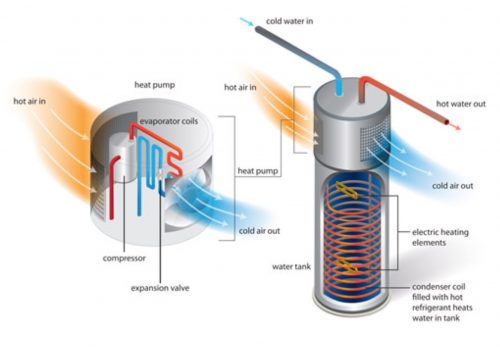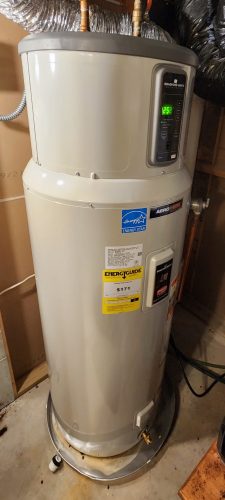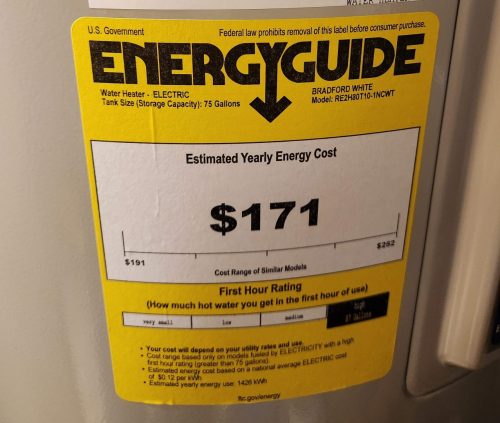Most water heaters come in two varieties; gas or electric. Gas water heaters use a flame to heat water, while electric water heaters use an electric heating element to heat the water. But there’s a third type of water heater available, which uses heat in the air to heat your water, kind of like an air conditioner running in reverse. It’s called a heat pump water heater (HPWH).

Concerns with cold climates
 I’ve been skeptical of HPWHs for cold-weather climates like Minnesota because they steal heat from the air. My basement is already cool enough; I don’t want some device stealing heat from my basement and making it colder, thank you very much. But after talking with a friend who had an HPWH installed many years ago, I think my concerns might be exaggerated.
I’ve been skeptical of HPWHs for cold-weather climates like Minnesota because they steal heat from the air. My basement is already cool enough; I don’t want some device stealing heat from my basement and making it colder, thank you very much. But after talking with a friend who had an HPWH installed many years ago, I think my concerns might be exaggerated.
My friend loves his HPWH and said it hadn’t made any noticeable difference to the temperature in his basement. I had to see for myself, so I stopped by on a 40° fall day to check it out. His water heater is installed in an unfinished furnace room, while the rest of the basement is finished off. I expected this room to be fairly cool, but it was just a little cooler than the rest of the basement, maybe by a few degrees. For all of the time I spend in my furnace room, I could certainly live with that.
For more than my tiny bit of anecdotal evidence, check out the Energy Vanguard blog post titled Will a Heat Pump Water Heater Freeze Your Basement? This is a summary of a study that was done on the matter. And my summary of that summary is “No.” The space will be a few degrees cooler while the HPWH is running, but the temperature will recover quickly after the water heater stops running.
Because HPWHs use air for heat, they can’t be installed in small closets like traditional water heaters. They need air. For instance, an A.O. Smith 50-gallon water heater needs a room with at least 760 cubic feet. You’re just there if you have a room with an 8′ ceiling that measures 10’x10′. There are ways of getting around this, but it gets complicated.
Money savings
On paper, you’ll save a ton of money with a HPWH. Because they use heat already in the air to heat your water, they use far less electricity than a traditional electric water heater. The EnergyGuide sticker on my friend’s 80-gallon water heater says his estimated yearly energy cost is $171.
You can’t find an 80-gallon residential electric water heater, so to compare apples to apples, let’s look at the specs of a 50-gallon water heater. A 50-gallon heat pump water heater will cost approximately $104 per year, while a traditional electric water heater will cost $424. Those are some huge savings!
But there’s no free lunch. During the heating season, you’re paying to heat that air in your home, so your furnace will have to work harder. I would be very interested in a study showing the impact, but I don’t know of any.
HPWHs also come with traditional electric heating elements to help them keep up with periods of high demand. You won’t save as much money if you set your water heater to use these electric heaters when needed.
While HPWHs are far more expensive than traditional electric water heaters, tax credits and rebates help to make them more attractive. One of the big box retailers near me sells a 50-gallon HPWH for $1,699, while a comparable 50-gallon electric water heater sells for $669. The federal government currently has a $300 tax credit for installing a heat pump water heater, and my local utility company has a $400 rebate for this particular unit. Assuming the labor costs were the same, I could expect to recoup my additional investment in the first year or two with $300/year in energy savings.
They’re noisy
The most significant complaint people have with HPWHs is the noise. After visiting my friend’s house, I get it. Even with the door closed to his furnace room, I could hear a noticeable steady hum in the basement that I don’t have to put up with at my own house. When you walk into the room, it’s especially noisy. I’d place it somewhere between that of an air conditioner and an old refrigerator.
If I ever decide to install one of these in my house, I’ll consider adding some soundproofing to my utility room.
Conclusion
I’m not entirely sold on heat pump water heaters, but I’m no longer the skeptic I used to be. I think it’s a viable product, even for a cold-weather climate like Minnesota. There’s a much larger up-front cost, they’re noisy, and you’ll make your basement colder. But you’ll save money in the long run and reduce your carbon footprint. This wouldn’t be enough incentive to make me switch from natural gas to an HPWH, but I’d consider one if I were to replace an electric water heater.
Related reading:


